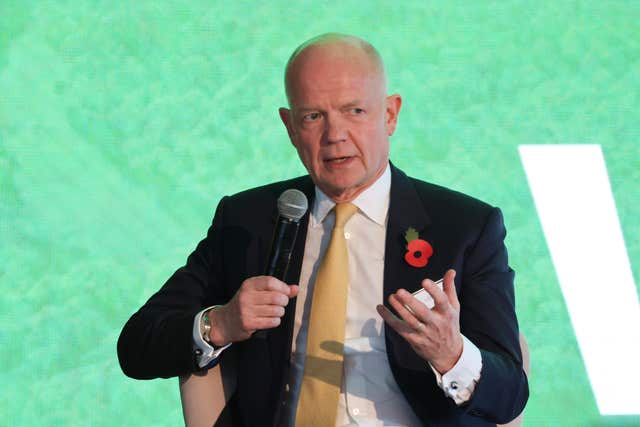Former Conservative leader Lord William Hague has been elected as the next chancellor of Oxford University.
Lord Hague beat a number of high-profile candidates, including Sarah Everard Inquiry chief Lady Elish Angiolini and Labour peer Lord Peter Mandelson, in the race for the historic position.
It comes after fellow Tory Lord Chris Patten announced that he would be retiring after more than 20 years in the role.
Lord Hague will be inaugurated as chancellor early in the new year and he will serve for a term of 10 years, the university announced on Wednesday.

Staff and alumni voted online for the first time to elect the chancellor – a post which has been in place at Oxford for 800 years.
The chancellor is the titular head of the university and they preside over key ceremonies, and they also chair the committee to elect the vice-chancellor, who leads the university.
In the final round of voting, Lord Hague received 12,609 votes, 1,603 more than second-placed candidate Lady Angiolini, chairwoman of the inquiry into Sarah Everard’s killer Wayne Couzens, who received 11,006 votes.
Lady Angiolini, who is the outgoing principal of St Hugh’s College in Oxford, and Baroness Jan Royall, outgoing principal of Somerville College in Oxford, had both hoped to become the university’s first female chancellor.
Labour grandee Lord Mandelson and former Conservative attorney general Dominic Grieve were also among the final five candidates.
In the first round of the election, members of the Convocation, which consists of Oxford University alumni and staff members, cast their votes for 38 candidates who had successfully applied for the role.
The alternative transferable vote system – where voters could rank as many of the candidates as they wanted – was used.
Overall, 24,908 alumni and staff members cast their votes in the second round of the election for the final five candidates.
Votes were transferred from lower ranking candidates until the winning candidate achieved more than 50% of the vote.
Mr Grieve was eliminated first, followed by Lord Mandelson and then Baroness Royall.
Lord Hague, who graduated from Magdalen College in Oxford in 1982, said: “Thank you to my fellow Oxonians for placing such confidence in me.
“I regard being elected as the chancellor of our university as the greatest honour of my life. I pay tribute to the other candidates, in particular for their commitment to the future of Oxford.
“What happens at Oxford in the next decade is critical to the success of the UK.”
Lord Hague, who studied philosophy, politics and economics at Oxford and was president of the Oxford Union, added: “My heart and soul are in Oxford and I will dedicate myself in the coming years to serving the university I love.”
Professor Irene Tracey, vice-chancellor of Oxford University, said: “I am delighted to welcome Lord Hague back to Oxford as its 160th chancellor. On behalf of the entire university community, I heartily congratulate him on being elected.
“I would like to extend my gratitude to the four unsuccessful candidates for their dedication and willingness to serve.
“William is a great friend to Oxford and is someone who I know will serve and represent this magnificent institution with dignity and vigour.”




Why are you making commenting on The National only available to subscribers?
We know there are thousands of National readers who want to debate, argue and go back and forth in the comments section of our stories. We’ve got the most informed readers in Scotland, asking each other the big questions about the future of our country.
Unfortunately, though, these important debates are being spoiled by a vocal minority of trolls who aren’t really interested in the issues, try to derail the conversations, register under fake names, and post vile abuse.
So that’s why we’ve decided to make the ability to comment only available to our paying subscribers. That way, all the trolls who post abuse on our website will have to pay if they want to join the debate – and risk a permanent ban from the account that they subscribe with.
The conversation will go back to what it should be about – people who care passionately about the issues, but disagree constructively on what we should do about them. Let’s get that debate started!
Callum Baird, Editor of The National
Comments: Our rules
We want our comments to be a lively and valuable part of our community - a place where readers can debate and engage with the most important local issues. The ability to comment on our stories is a privilege, not a right, however, and that privilege may be withdrawn if it is abused or misused.
Please report any comments that break our rules.
Read the rules here